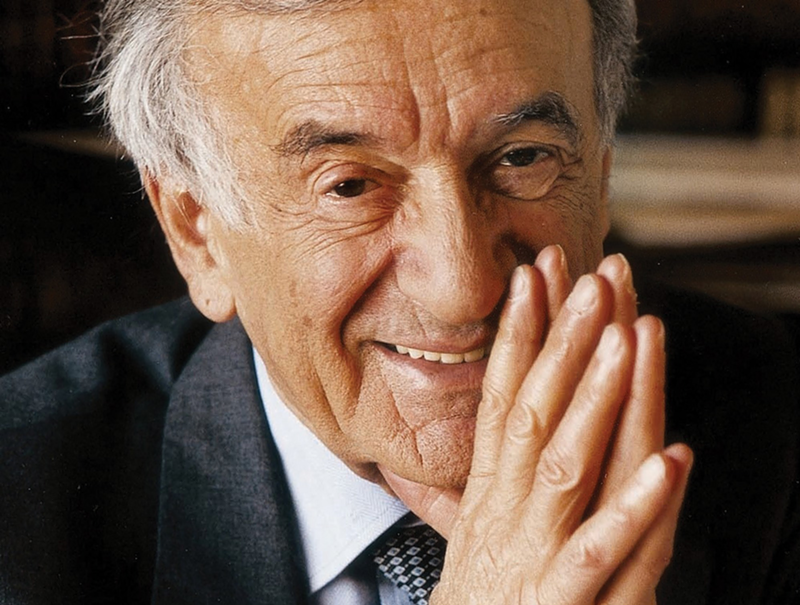Elie Wiesel, the Nobel Peace Prize winner and human-rights advocate whose landmark 1956 memoir of surviving the Holocaust, Night, has been translated into more than 30 languages, will speak Sunday evening at Xavier University’s Cintas Center. For his sponsoring agency, his speech will be more than just a history lesson.
“We are hoping that he will talk about the importance of Holocaust memory and education and the global implications of the Holocaust,” says Sarah Weiss, executive director of Cincinnati’s Center for Holocaust & Humanity Education, via email. “So, we hope the speech goes from the past to lessons for the present.”
That, Wiesel says during a phone interview, will be one of his priorities. He realizes there is an increasing urgency among young people worldwide to hear him and other Holocaust survivors talk about their experiences as targets of the systematic mass murder of European Jews during the reign of Nazi Germany and what it means to the way we live now. (The United States Holocaust Memorial Museum in Washington reports that the Nazis and their collaborators murdered approximately six million of Europe’s nine million Jews.)
“Time is getting farther and farther away from the event itself,” he says. “And the best witnesses are the survivors, who are getting old,” says Wiesel, himself 83. “The students themselves feel this is the last opportunity for them who are young to meet those who went through the trails and tragedies of those times. And I say that whoever listens to a witness becomes a witness.”
Wiesel was born in a part of Romania that became the territory of Hungary — a German ally that eventually was occupied by the Nazis — during World War II. At age 15 he and his family were sent to the Auschwitz concentration/extermination camp, where his mother and younger sister died. He and his father were then sent to another camp, Buchenwald, where his father died. After liberation in 1945, Wiesel went to Paris and became a writer, publishing Night first in Yiddish and then in French (1958) and English (1960).
He has written more than 50 books and is currently the Andrew W. Mellon Professor in the Humanities at Boston University. And he has become an advocate for worldwide human rights.
After receiving the Nobel Peace Prize in 1986, he and his wife started the Elie Wiesel Foundation for Humanity, which — according to material provided by the Washington Speakers Bureau, which represents him — tries to promote understanding and combat present-day injustice, using the memory of the Holocaust in its task.
As it turns out, “Holocaust” is a word that Wiesel says he uses reluctantly. “When I use it, I say, ‘What we so poorly call the Holocaust,’ ” he says. “You cannot find a single word to describe what happened. In the beginning I used it because I felt there was nothing better than that, but even that word doesn’t express the entire depravity of the experience.”
When Wiesel wrote Night, the literature of the Holocaust was just beginning. (The Diary of a Young Girl — published after its Dutch writer, Anne Frank, had been discovered by Nazis while in hiding and sent to a concentration camp to die — had become a U.S. bestseller after an English translation appeared in 1952.) But things have changed dramatically.
“When I published Night there were very few courses on the Holocaust,” Wiesel says. “Today there isn’t a school that doesn’t teach this subject. There isn’t a day without a book published on the subject. There isn’t a week without a conference on the subject. There are more possibilities today to create an awareness.”
And that’s important, he says, because the Holocaust is as crucial to the study of civilization as is Socrates or Shakespeare. “Absolutely,” he says.
While the first two represent peaks in human achievement, the Holocaust represents the nadir. And that’s important to learn about in order to do better, to live ethically and humanely and avoid hate. “It sensitizes us to the other people’s suffering,” he says. “I think this is the most important endeavor — to sensitize someone else.”
While he doubts an organized ethnic extermination on the scale of the Holocaust could happen again, he knows the genocidal impulse is still alive in humanity — Rwanda in 1994 was an example of that. “Mass murders exist, hatred exists, suffering exists,” Wiesel says. “For us to face and confront the tragedies of the present, we must locate them in the context that goes back to those (Holocaust) times.”
ELIE WIESEL will speak at the Cintas Center Sunday. Tickets: 513-487-3055,
www.holocaustandhumanity.org


